The road from Subotica through the center of Palić in the direction of Lake Tresetište leads to a paved road barely wide enough for two cars to pass each other. Where the road forks, instead of asphalt there is only soil and grit.
The road cuts through state-owned fields and stretches next to a traditional Hungarian restaurant at the lake. Then the traveler comes across a sign with a warning reading: PRIVATE PROPERTY – NO TRESPASSING!
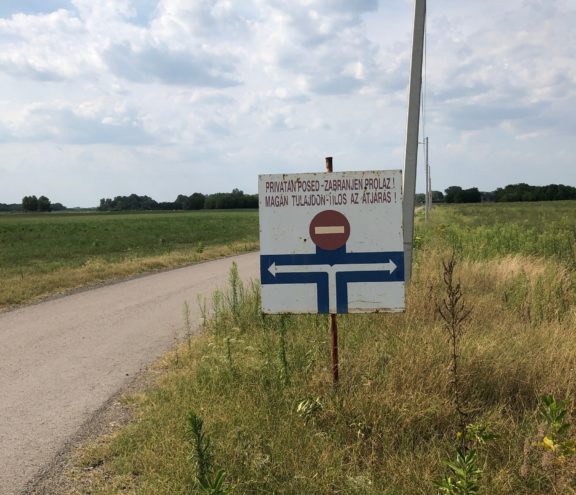
farm near Palić; photo: CINS
What lies 670 meters from the sign is a picturesque salaš farm with a swimming pool and a small house in a yard, which Center for Investigative Journalism of Serbia (CINS) journalists toured.
These buildings are owned by the Serbian Progressive Party.
Research conducted by CINS shows how the Serbian Progressive Party went from being a party with no real estate to becoming the owner of buildings and land worth upwards of 224 million dinars after it came to power. In 2014, the ruling party changed, in urgent procedure, the Law on Financing Political Activities, thereby allowing parties to buy real estate also by using budget funds. However, even though parties formally report whether they have used public or private money to purchase a piece of real estate, in reality that is difficult to control, CINS’ interlocutors say.
The Serbian Progressive Party paid just over 7.1 million dinars for this farm in Vojvodina in July 2019. According to Republic Geodetic Authority data, the structures in question occupy a surface area of close to 700 square meters.
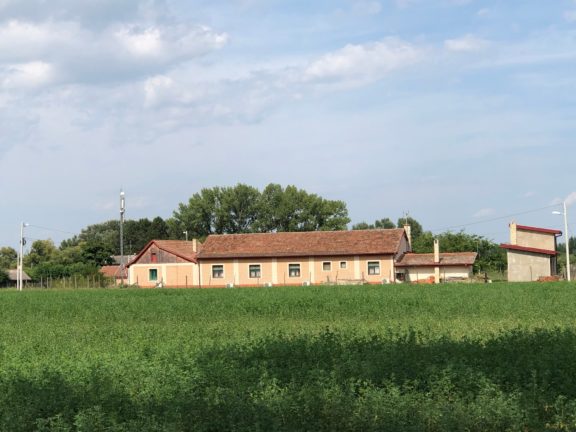
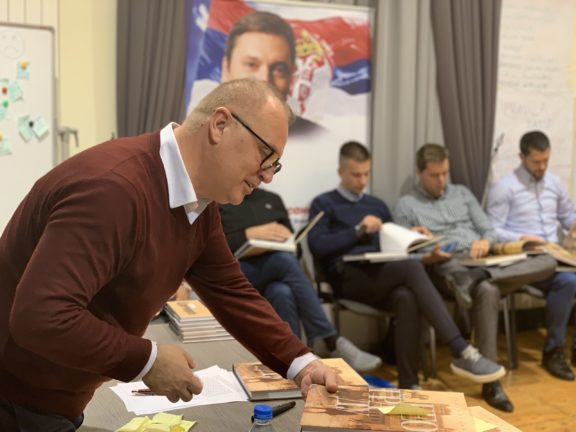
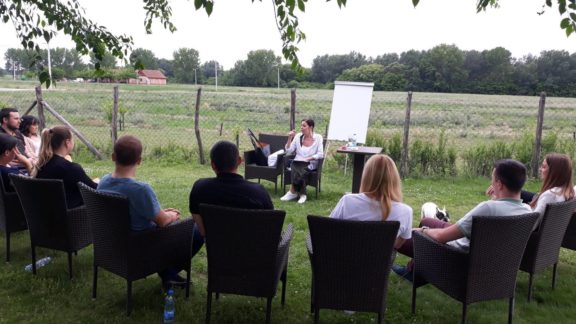
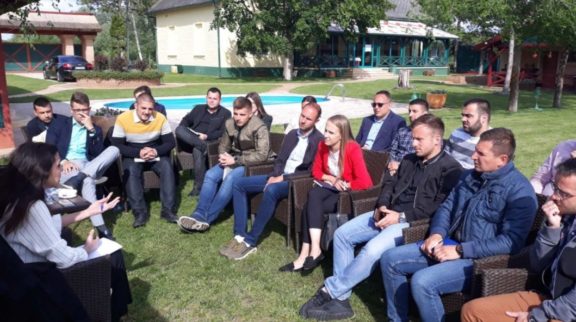
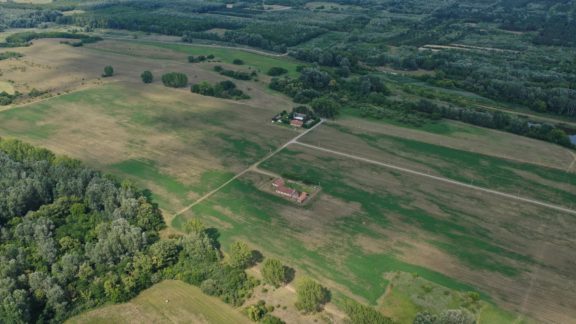

Although the entirety of what is located at the farm and the purposes for which the farm near the Hungarian border is used are not known, educational sessions for students of the party’s Young Leaders Academy were held there at least twice last year. The lecturer was Pink TV journalist and ex-wife of President Aleksandar Vučić, Ksenija Vučić.
A number of state and party officials have also passed through the property near Palić – from Minister of Finance Siniša Mali, through Post of Serbia acting director Zoran Đorđević, to the president of Serbia and the Progressive party, Vučić.
Psychologist and former MP of the Liberal Democratic Party Žarko Korać also spent an afternoon at the Serbian Progressive Party farm. He says he was invited two years ago, when the Academy “was at its beginning,” so that the students could “learn to talk with someone who thinks differently.” He adds he also got a small fee for that.
What is the Serbian Progressive Party Academy?
The Young Leaders Academy aims to educate young members of the Serbian Progressive Party through lectures on various political topics, with an emphasis on debating and public presentation.
The Academy is run by the For Serbian People and State Foundation, which the Serbian Progressive Party founded in September 2019. The Foundation’s Articles of Association were personally signed by Aleksandar Vučić.
Three months before this foundation was established, the Serbian Progressive Party paid the Public Policy Institute, represented by Vladimir Beba Popović, 1.6 million dinars to put together an educational program.
“I was just taken there and back. (…) They (students of the Academy, journalist’s note) were very decent, I must say. But I later heard that no one from that group joined the Serbian Progressive Party,” Korać told CINS.
Korać could not say what was located inside those rooms, but he thinks that is where the young people sleep.
A portion of the farm, spanning 146 square meters and built without a permit, is owned by Dejan Matić, a former head of Belgrade’s Municipality of Zemun and the incumbent acting director of the Directorate of Joint Affairs.
Despite the fact that in the latest report on assets and income late last year Matić did not report his ownership of the real estate, representatives of the Anti-Corruption Agency told CINS they had not noticed any irregularities and would not be launching a procedure against Matić.
All the Progressive party real estate
CINS wrote earlier about the office space in Novi Beograd, at the so-called Old Mercator, where the party headquarters is located. The space used to belong to the Vetfarm company which went bankrupt, and then a consortium of 27 people, predominantly from Kruševac, headed by then local Progressive party alderman Velibor Jovanović, bought it at an auction for about 250,000 euros.
They donated the space to the party in 2017, but as CINS learned the value of that gift far surpassed the permitted value, which is why the Anti-Corruption Agency is investigating the case.
However, not long after the farm in Subotica, the Progressives purchased more office space at the Old Mercator, spanning 418 square meters. According to State Audit Institution (SAI) data, they paid 43.5 million dinars for it.
The space in question comprises several offices which used to be occupied by the Beolink company. The office space was previously owned by the wife of the company general manager, Saša Stojković, who says that the sale and purchase agreement was signed with Vučić.
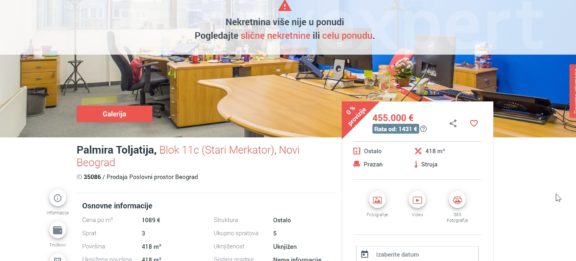
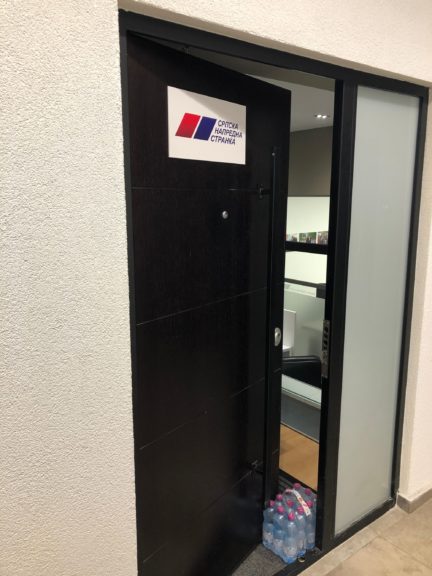
The SAI listed the purchase in its 2019 audit report, but refused to provide the data from the sale and purchase agreement to CINS. As the Institution representatives put it, the matter is a business secret.
CINS has discovered that the party became the owner of yet more office space at the same address – with a surface area of 268 square meters, which it mortgaged to Halkbank in 2020.
The Serbian Progressive Party has another piece of real estate near a border, this time the Serbia–Romania one.
In Srpska Crnja, a small town in Vojvodina’s Banat region, the ruling party owns a strip mall.
According to cadastral data, the structure spans 384 square meters and the party also owns the field behind the structure. However, apart from a six-room commercial space that houses the party’s municipal chapter, the Progressive party does not own the other stores in the mall.
One of them is a café. Owner Aleksandar Zukić says the Serbian Progressive Party bought the commercial property two years ago.
CINS tried to confirm this, but the telephone number of the local chapter listed on the party website is no longer in service. The journalists contacted municipal administration official Ana Grahovac, who promised to give the number to the party secretary in Srpska Crnja, but he did not call us.
The Serbian Progressive Party did not answer the questions we sent them.
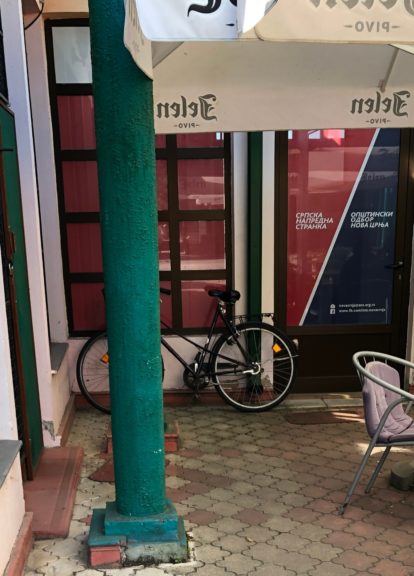
We also wrote earlier that the Progressive party became the owner of a commercial property in Kruševac, too, in February 2016. Velibor Jovanović led a consortium of 20 citizens who bought a commercial property on Balkanska Ulica Street in downtown Kruševac and then donated it to the Progressive party two months later. At the time of purchase, the property was worth just over 13 million dinars.
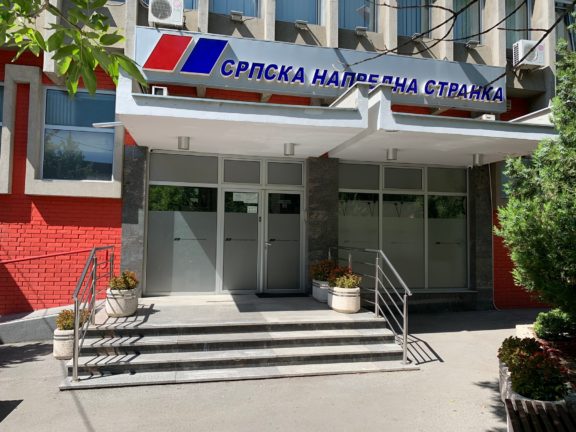
Other parties are tenants
Up until 2014, political parties were able to buy office space using only their own money. However, amendments to the Law on Financing Political Activities enabled parties to use budget funds as well to buy real estate which they would use for their own needs.
The amendments were proposed by Serbian Progressive Party MPs, and the person tasked with presenting this act was then MP Zoran Babić.
Before the amendments were adopted, Tatjana Babić, who was the director of the Anti-Corruption Agency at the time, warned that parties could buy multiple pieces of real estate “which could be used for a purpose that significantly surpasses the boundaries of political activities.”
Nemanja Nenadić of Transparency Serbia says that parties cannot earn income from office space, i.e. lease it out, for example, rather they can only use it for political activities. Nonetheless, he adds that it is difficult to control but does not even know whether anyone has ever attempted to control it.
There is another problem Zoran Stojiljković, a former chairman of the Agency Board, warns about. In the absence of legal regulations, parties might sell the office space they purchased using citizens’ money and then keep that money:
“The big question is what will happen to what was bought with state money. There are no clear limitations for that. (…) If it is their property, those limitations are non-existent.”
Aside from sale, a motive for buying real estate can also be owning property which a party would use as loan collateral, Stojiljković adds.
CINS reveals that it was exactly the Serbian Progressive Party that mortgaged the office space in Novi Beograd and the commercial property in Kruševac it had received as gifts, to Halkbank in May 2020, as collateral for a loan worth two million euros.
Besides the ruling party, the only other party whose property has increased since the legal amendments made in 2014 is the Socialist Party of Serbia. According to the 2020 financial statement, the Socialists have real estate worth as much as 1.6 billion dinars.
However, vice president of the Socialist party’s Executive Committee Đorđe Čabarkapa explained to CINS that this was not a matter of buying new property, but rather of registering existing property.
The Democratic Party, the Freedom and Justice Party, Dveri, the Free Citizens Movement, and the People’s Party do not own any party office space.
Just over a year after the aforementioned legal amendments, the Democrats lost the villa at 69 Krunska Street, where the party had “resided” for 20 years. As CINS reported earlier, after restitution the villa was given back to the heir, who later sold it to TDI Radio co-owner Miloš Krdžić, the man who privatized broadcaster Studio B in 2015.
Nemanja Nenadić points out that the legal amendments pertaining to the purchase of real estate with public funds benefited the Serbian Progressive Party the most.
“They are the only ones who have excess money since they have been getting by far the most (money) from the budget for years, on account of being the most represented in the parliament. They are the only ones who can afford it.”
This investigative story has been produced with the financial assistance of the European Union, as part of the project ‘PrEUgovor Policy Watch: building alliances for stronger impact in uncertain future’. The contents of this story are the sole responsibility of the authors and can under no circumstances be regarded as reflecting the position of the European Union.

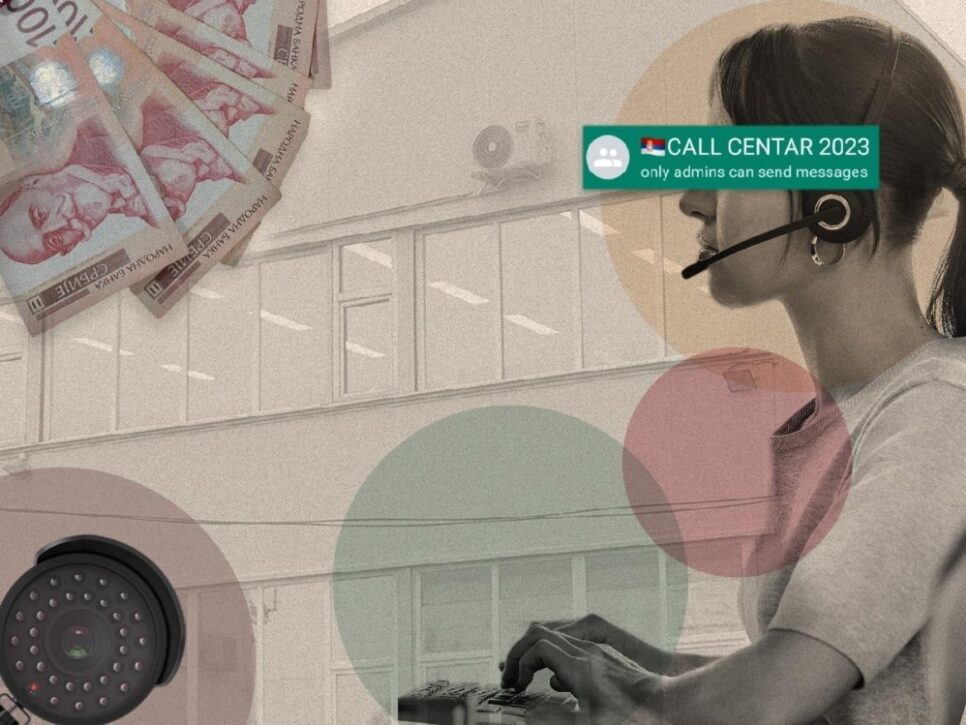
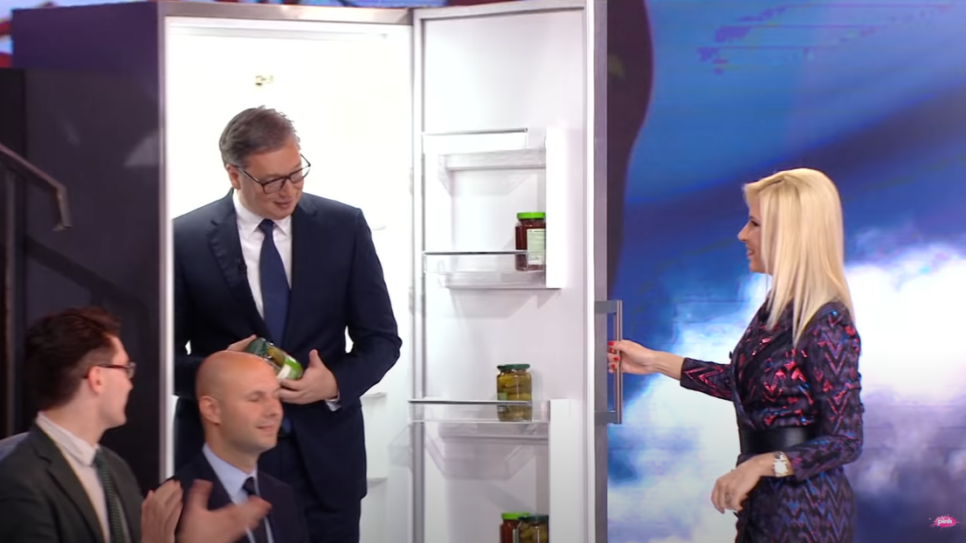
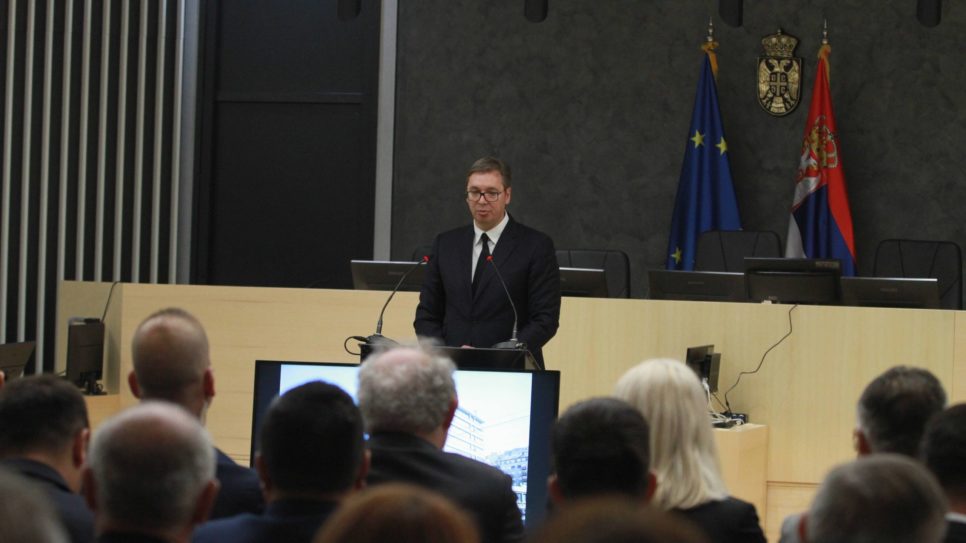
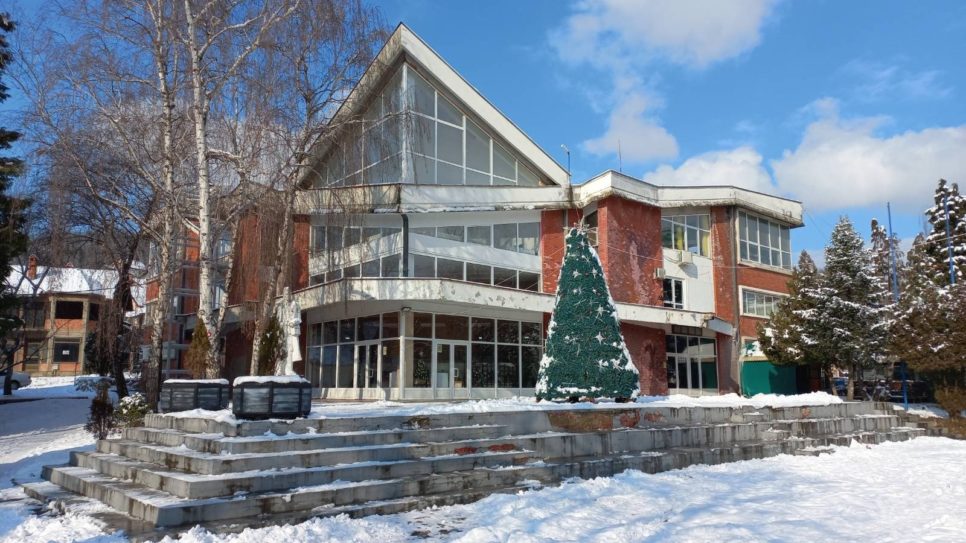

What do you think